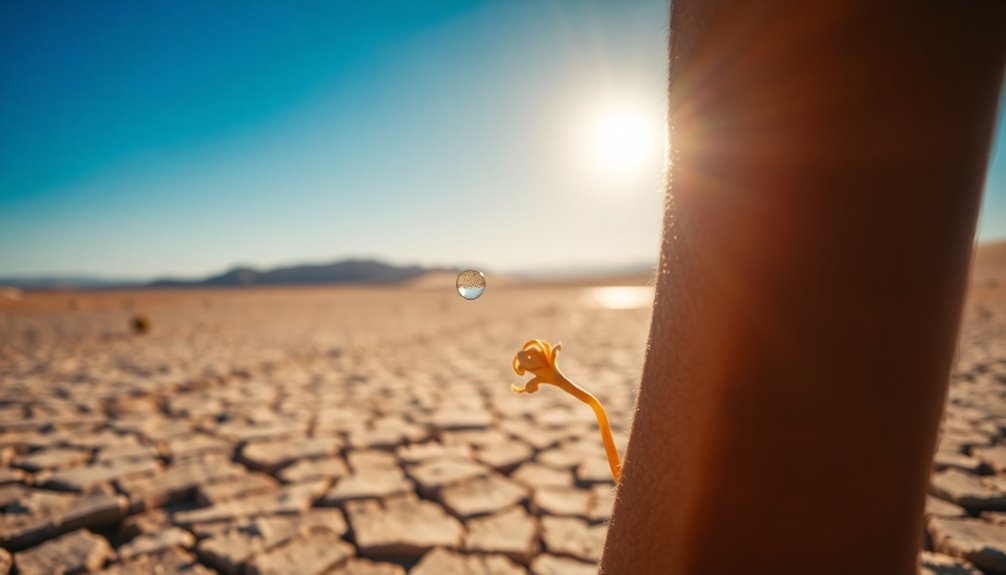To recognize the early signs of dehydration, pay attention to your body. You might feel thirsty, have a dry mouth, or notice changes in your skin's elasticity. Dark yellow urine is a warning sign; clear or pale yellow indicates good hydration. Additionally, watch for fatigue, dizziness, or mental confusion. If you experience muscle cramps or reduced urine output, it's time to hydrate. Risk factors include hot weather and intense activity, so stay proactive. Identifying these symptoms early can prevent serious complications and help maintain your well-being. There's more you can do to stay hydrated effectively.
Key Takeaways
- Monitor for early signs like thirst, dry mouth, and dry lips, indicating initial dehydration.
- Observe changes in skin elasticity; reduced elasticity can signal dehydration.
- Check urine color; clear or pale yellow indicates good hydration, while dark yellow suggests dehydration.
- Be aware of behavioral changes like confusion, difficulty concentrating, and emotional responses due to fluid deficiency.
- Keep a hydration schedule and increase fluid intake during hot weather or physical activity to prevent dehydration.
Common Symptoms to Watch For
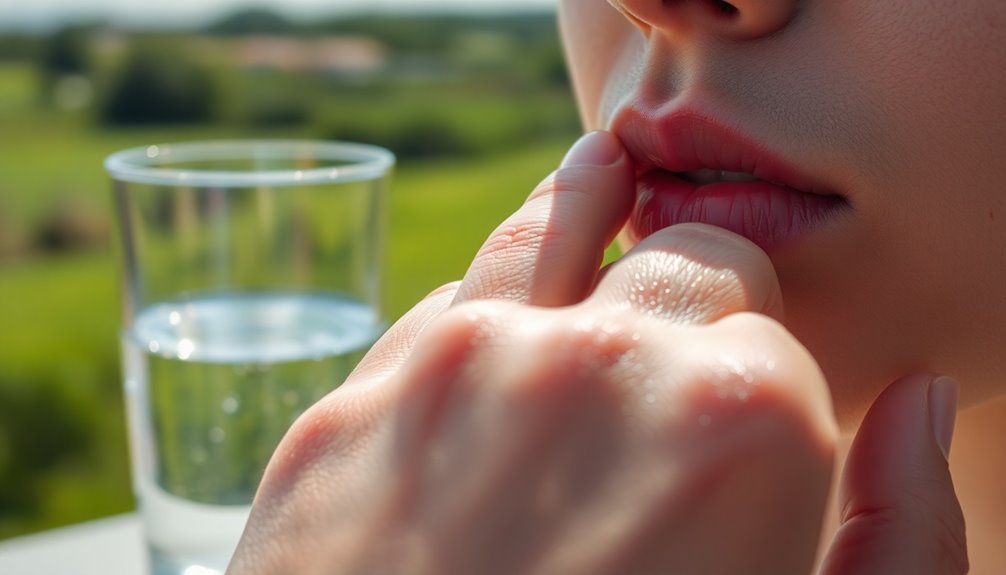
When it comes to dehydration, spotting the warning signs early can make a significant difference. You mightn't realize it, but your body is constantly communicating with you. Some common symptoms to watch for include changes in your mental clarity and skin elasticity.
If you're feeling a bit foggy or having trouble concentrating, dehydration could be the culprit. Your brain needs adequate hydration to function at its best. When you're well-hydrated, you tend to think more clearly and stay focused. So, if you find yourself struggling to stay sharp during that important meeting or while studying, consider reaching for a glass of water.
Another sign to keep an eye on is your skin's elasticity. Gently pinch the skin on the back of your hand; if it doesn't bounce back quickly, it may indicate you're not getting enough fluids. Healthy skin should be plump and supple, reflecting your overall well-being. Dry or flaky skin can further exacerbate feelings of discomfort, making you feel less connected to others. Additionally, maintaining proper hydration is essential for rapid and healthy fat loss, which can enhance your overall health.
Recognizing these signs can help you take action before dehydration affects your daily life. By staying attuned to how your body feels, you can foster a sense of belonging in your community and engage more fully in your activities. So, keep an eye on your mental clarity and skin elasticity, and don't hesitate to hydrate! After all, feeling your best allows you to connect with others more authentically.
Physical Signs of Dehydration
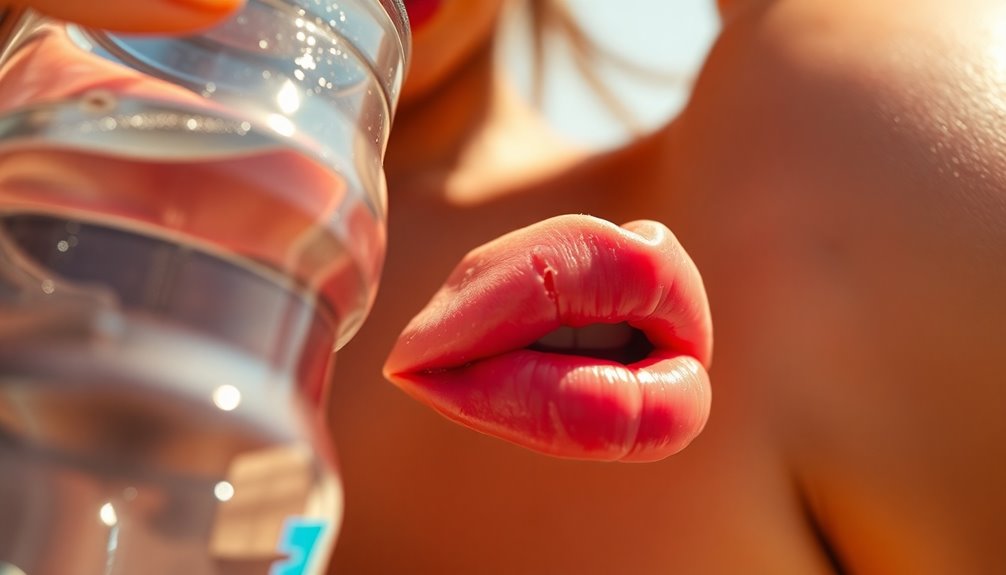
While mental clarity and skin elasticity are key indicators, physical signs of dehydration can be just as revealing. When your body's hydration levels drop, you might start to notice some distinct physical cues. Pay close attention to how your mouth feels; a dry mouth is often one of the first signs that you need to drink more water. You might also experience thirst cues that signal your body's need for fluids. Don't ignore these signals—your body's trying to tell you something significant!
Another physical sign to watch for is changes in skin elasticity. If you pinch the skin on your hand and it doesn't bounce back quickly, this could indicate dehydration. Staying hydrated helps keep your skin looking vibrant and healthy, so it's essential to take action if you notice this change.
Additionally, muscle cramps can be a telltale sign that your body is lacking the necessary fluids and electrolytes. If you find yourself cramping during exercise or even while resting, it might be time to reevaluate your hydration habits.
Changes in Urine Color
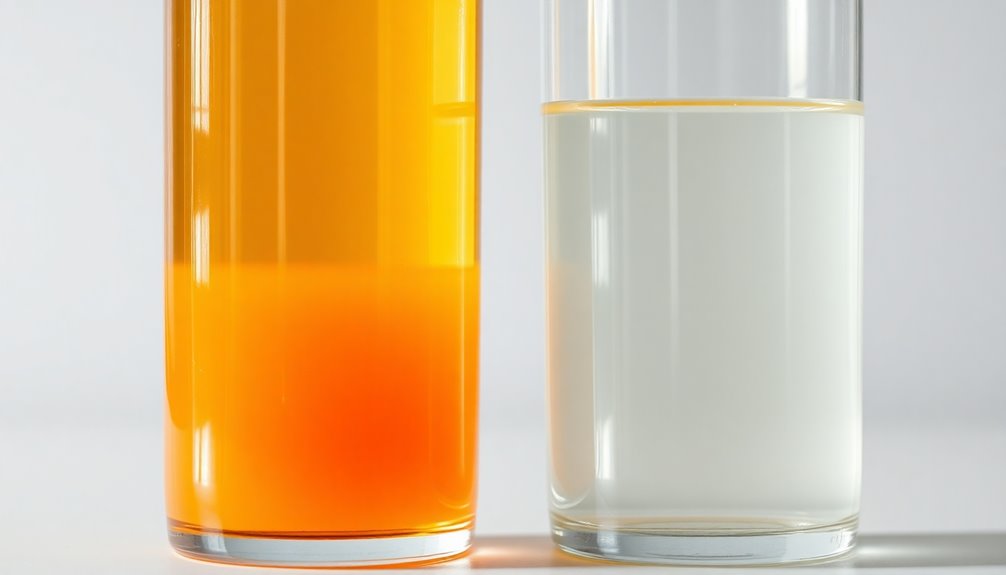
Pay attention to the color of your urine, as it can reveal a lot about your hydration status. Your urine's color can be a quick and easy indicator of how well-hydrated you are. If you're part of a community that values health and well-being, you'll want to keep an eye on this important sign. Here's a simple guide to help you understand what your urine color says about your hydration levels:
- Clear or Pale Yellow: This usually means you're well-hydrated. Great job!
- Dark Yellow: If your urine looks like apple juice, it's a sign you need to drink more water.
- Amber or Honey: This indicates moderate dehydration. Your body's sending you a message—time to hydrate!
- Brown: Dark brown urine can signal severe dehydration or even health implications that require immediate attention.
Recognizing these changes in urine color helps you maintain proper hydration levels, which is essential for overall health. In addition to hydration, a plant-based diet can also support your body's ability to maintain optimal fluid balance. Remember, staying hydrated not only supports your physical health but also enhances your mental well-being. If you notice persistent changes in color, it's important to evaluate your fluid intake and, if necessary, consult with a healthcare professional.
Impact on Energy Levels
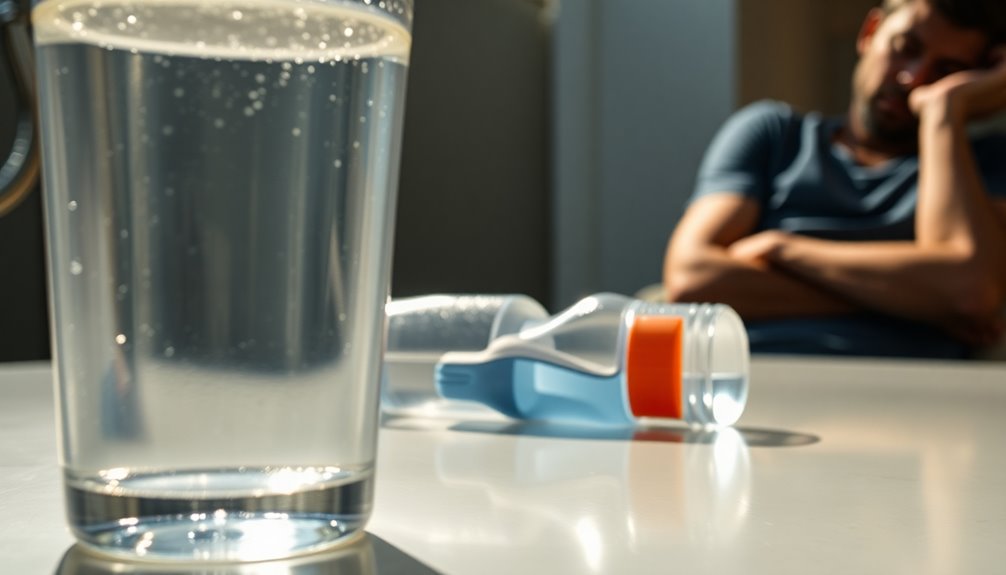
Staying properly hydrated plays an essential role in maintaining your energy levels throughout the day. When you're dehydrated, you might notice a significant dip in your energy, making even simple tasks feel challenging. This is because hydration directly affects your body's ability to perform physical activities and cognitive functions.
Here's a quick overview of how dehydration can impact you:
| Effect | Symptoms | Solutions |
|---|---|---|
| Physical Performance | Fatigue, muscle cramps | Drink water before, during, and after exercise |
| Mental Clarity | Difficulty concentrating | Incorporate water breaks during work or study sessions |
| Mood Changes | Irritability, lethargy | Set reminders to drink water regularly |
When you engage in hydration and exercise, you optimize your performance and maintain focus throughout the day. Conversely, dehydration can lead to cognitive decline, resulting in slower reaction times and poor decision-making. You might find it harder to concentrate or remember things, which can be frustrating. Additionally, staying hydrated helps to maximize heart rate variability, which is essential for maintaining optimal performance in both physical and mental tasks.
Behavioral Indicators
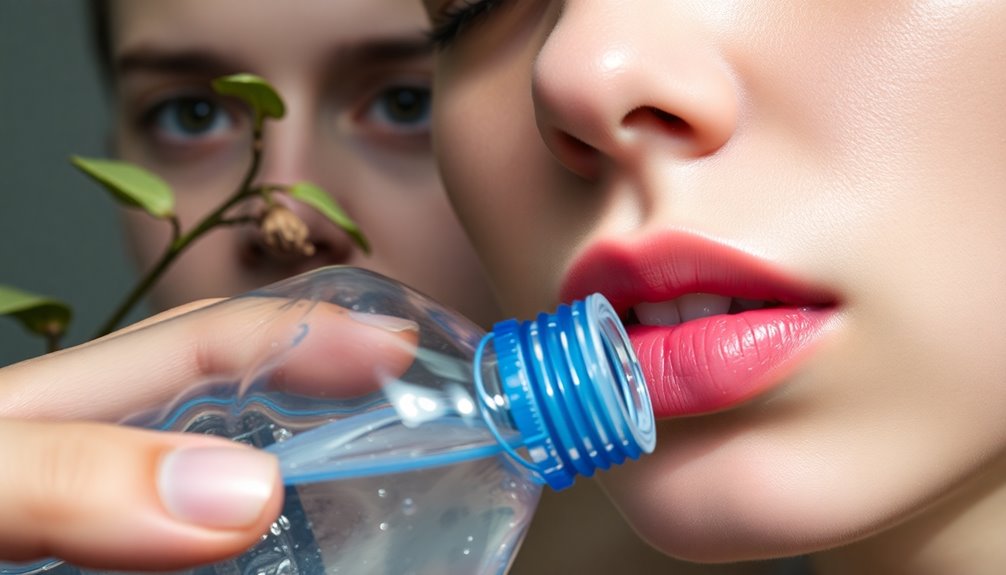
Recognizing the behavioral indicators of dehydration can be essential for maintaining your overall well-being. When you're not getting enough fluids, you might notice changes in both your cognitive effects and emotional responses. Staying aware of these signs can help you take action before things get worse.
Here are some key behavioral indicators to watch for:
- Confusion or Difficulty Concentrating: You might find it harder to focus on tasks or remember things. This could be a sign that your brain isn't getting the hydration it needs.
- Irritability: If you're feeling unusually cranky or short-tempered, it could be linked to dehydration. Your emotional responses can be heightened when your body lacks water.
- Lethargy: Feeling more sluggish than usual? A lack of energy can stem from dehydration, affecting how you interact with others and engage in activities.
- Increased Thirst: While this seems obvious, an intense feeling of thirst often signals that your body is already in need of fluids. Listen to this cue!
Additionally, incorporating fresh, whole fruits into your diet can help improve hydration levels and overall health.
Risk Factors for Dehydration
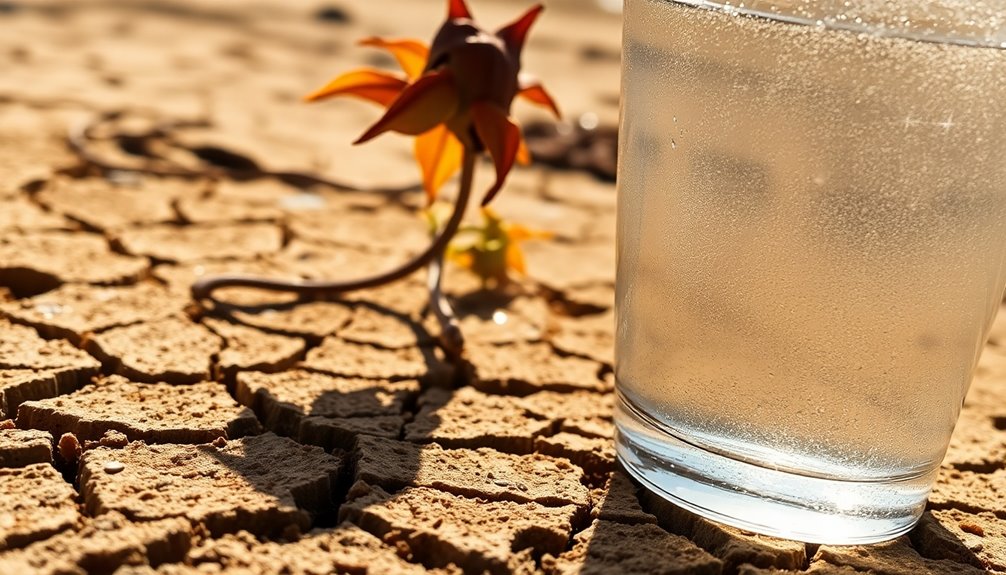
Several factors can increase your risk of dehydration, making it essential to stay attentive. One key aspect to keep in mind is your hydration levels, which can fluctuate based on your activity and environmental conditions. If you're sweating a lot, whether from exercise or simply being outdoors in the heat, you need to replenish those lost fluids consistently.
Age demographics play a significant role in your risk, too. Older adults often have a diminished sense of thirst, which can lead to underestimating their fluid needs. If you're caring for an elderly family member, it's important to encourage regular hydration.
Conversely, children are also at risk, as they may become dehydrated quickly during play, especially in warm weather.
Certain medical conditions can further elevate your risk. If you've been diagnosed with diabetes or gastrointestinal issues, you might find your body loses fluids more rapidly. Medications can also contribute—some can cause increased urination or decreased thirst.
Don't overlook lifestyle factors! If you're in a high-stress job or frequently consume caffeinated beverages, your hydration levels could suffer. Remember, it's not just about drinking water; you should also be mindful of your overall fluid intake from foods and other beverages.
Additionally, understanding the link between underlying health conditions and dehydration can help you better manage your hydration needs, especially if you have chronic conditions like CKD.
Being aware of these risk factors can help you proactively manage your hydration. So, take a moment to assess your daily habits and make adjustments that could safeguard you from the dangers of dehydration.
Preventative Measures to Take
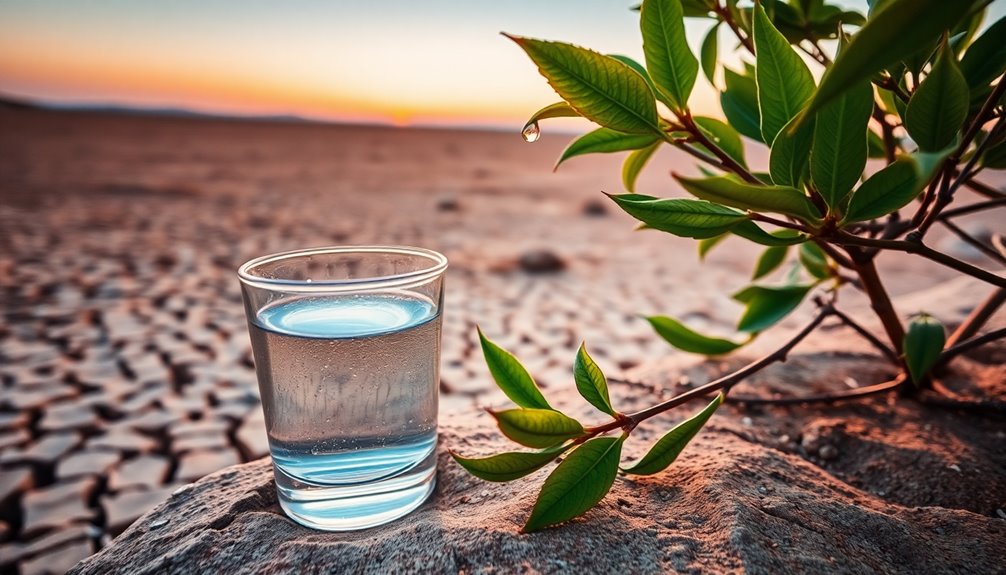
Taking proactive steps can greatly reduce your risk of dehydration. By implementing a few simple strategies, you can [CONFIRM] your body stays hydrated and healthy. Here are some effective preventative measures you can take:
- Establish a Hydration Schedule: Set reminders to drink water throughout the day. Aim for at least eight 8-ounce glasses, or more if you're active or in a hot environment. Consistency is key!
- Monitor Your Electrolyte Intake: When you're sweating or exercising, replenish lost electrolytes. Consider sports drinks or electrolyte tablets to maintain balance, especially during intense workouts.
- Eat Hydrating Foods: Incorporate fruits and vegetables into your meals. Watermelon, cucumbers, and oranges aren't only tasty but also packed with water. These options can help you stay hydrated without just relying on liquids.
- Adjust for Activity Levels: If you know you'll be active or spending time outdoors, increase your fluid intake beforehand. Hydrating before you feel thirsty can make all the difference.
When to Seek Medical Help
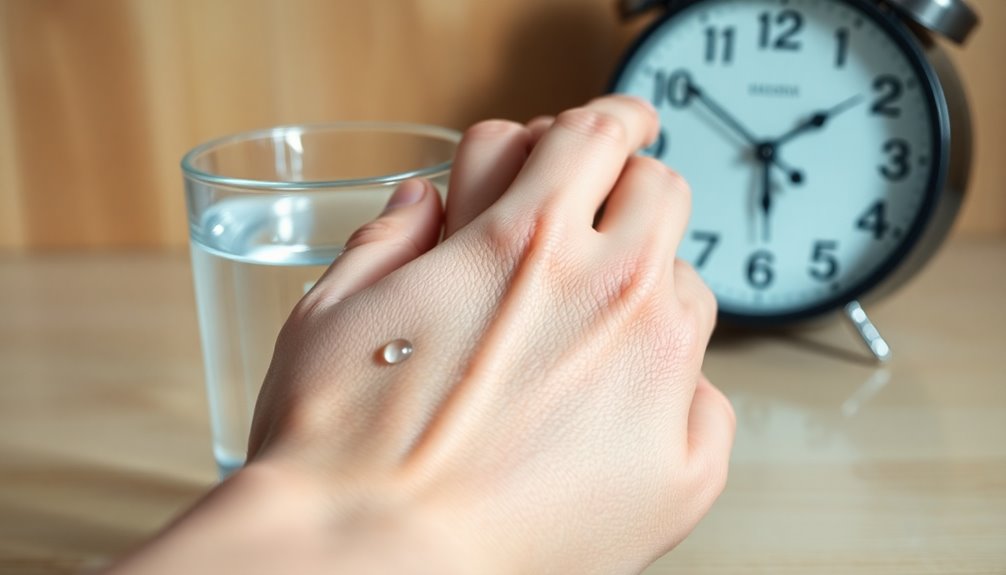
Knowing when to seek medical help for dehydration is important for your health. If you notice any of the common signs of dehydration—like excessive thirst, dry mouth, or dark urine—it's essential to pay attention. However, there are specific situations where you shouldn't wait to get help.
If your hydration levels drop significantly and you experience severe symptoms, such as confusion, dizziness, or fainting, it's time to seek medical intervention immediately. These symptoms indicate that your body is struggling to maintain proper function due to a lack of fluids.
Additionally, if you're unable to keep fluids down because of vomiting or diarrhea lasting more than 24 hours, you should consult a healthcare professional. This can quickly escalate into a more serious situation, especially for vulnerable populations like young children, the elderly, or those with pre-existing health conditions. Chronic stress can also contribute to high blood pressure, which can be exacerbated by dehydration.
Remember, even mild dehydration can lead to serious problems if left unaddressed. If you're feeling weak, lethargic, or have a rapid heartbeat, don't hesitate to reach out for help. Your health and well-being are worth it.
Staying connected with your body's needs is a crucial part of caring for yourself. Don't ignore the signals—recognizing when to seek medical assistance can make all the difference in your recovery and overall health. Take charge of your hydration and your health today!
Frequently Asked Questions
How Much Water Should I Drink Daily to Prevent Dehydration?
To stay hydrated, following hydration guidelines tailored to your lifestyle is crucial. Generally, aim for about 8 to 10 cups of water daily, but you might need more if you're active or in a hot climate. Listen to your body—if you're thirsty, drink! Tracking your water intake can help make sure you're meeting your needs.
Can Certain Foods Help With Hydration Levels?
Think of hydration smoothies as your secret potion for quenching thirst—blending fruits and veggies to create a deliciously invigorating drink!
And don't forget those tasty electrolyte snacks, like bananas or yogurt, that'll keep your energy soaring while replenishing lost fluids.
Incorporating these into your diet makes staying hydrated not just easy, but downright enjoyable.
Are There Specific Groups More Prone to Dehydration?
Yes, certain groups are more prone to dehydration. Elderly individuals often struggle due to decreased thirst cues and medications. Athletes can lose significant fluids during intense workouts, making hydration essential. Children may not recognize their thirst, while pregnant women face increased fluid needs to support both themselves and their babies. It's important for everyone in these groups to stay mindful of their hydration to maintain overall health and well-being.
Is Caffeine Consumption Linked to Dehydration?
Imagine walking through a desert, parched and desperate for water.
Caffeine effects can indeed play a role in hydration. While many believe hydration myths suggest coffee or tea dehydrate you, studies show moderate caffeine intake doesn't greatly harm hydration levels.
Still, it's essential to balance your caffeine consumption with plenty of water. So, enjoy your favorite caffeinated drinks, but remember to hydrate to keep yourself feeling your best!
What Environmental Factors Contribute to Dehydration Risk?
When you're out in the heat, humidity can really ramp up your risk of dehydration. If you're exercising intensely, your body loses fluids quickly, so staying hydrated is essential.
At higher altitudes, the air is drier, which means you mightn't even realize how much water you're losing. Recognizing these environmental factors is vital; they can sneak up on you, especially if you're focused on your workout or enjoying outdoor activities with friends.
Conclusion
Staying hydrated is essential for your overall health. Did you know that even mild dehydration can impact your mood and cognitive function? By recognizing the early signs of dehydration—like dry mouth, fatigue, or dark urine—you can take action before things escalate. Remember, prevention is key. Make it a habit to drink water regularly, especially during hot weather or exercise. Don't wait until you're thirsty; your body will thank you for it!

